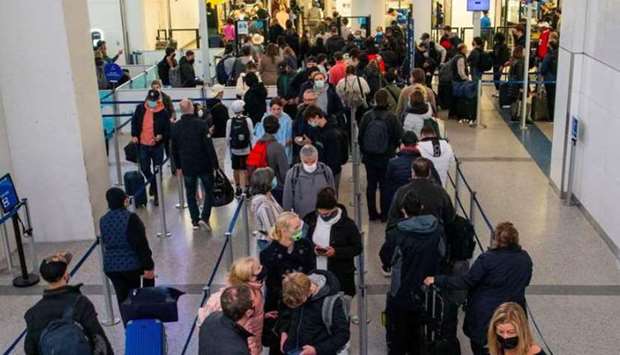Air travellers to the United States will face tougher Covid-19 testing rules, as several countries moved to seal-off their borders amid heightened uncertainty around the virulence of the Omicron variant and its ability to dodge existing vaccines.
In Asia-Pacific, Japan and Hong Kong said they would expand travel curbs, while Australia braced for more cases of the coronavirus variant after at least two people visited several locations in its biggest city while likely infectious.
In an attempt to stave off hasty border curbs, the World Health Organization (WHO) urged countries to apply "an evidence-informed and risk-based approach" to travel measures, saying "blanket travel bans will not prevent the international spread, and they place a heavy burden on lives and livelihoods".
Investors remained on edge on Wednesday, even as financial markets came off lows plumbed a day earlier following remarks by the CEO of Moderna (MRNA.O) that raised questions about the efficacy of Covid-19 vaccines against Omicron.
Global health officials have since offered reassurances and reiterated calls for people to get vaccinated.
"Even if the new variant becomes more widespread, the vaccines we have will continue to provide protection," European Medicines Agency Executive Director Emer Cooke said.
Laboratory analyses should indicate over the next two weeks whether the blood of vaccinated people has sufficient antibodies to neutralise the new variant, Cooke said, echoing remarks by vaccine maker BioNTech and scientists.
BioNTech's CEO said the vaccine it makes in a partnership with Pfizer (PFE.N) would likely offer strong protection against severe disease from Omicron.
Britain and the United States have both pushed their booster programmes in response to the new variant.
First reported in southern Africa a week ago, Omicron has triggered global alarm, roiled markets, led to travel bans, and highlighted the disparity between massive vaccination pushes in rich nations and sparse inoculation in the developing world.
Some 56 countries were reportedly implementing travel measures to guard against Omicron as of Nov. 28, the WHO said.
"I well understand the concern of all countries to protect their citizens against a variant that we don't yet fully understand," WHO head Tedros Adhanom Ghebreyesus said.
"But I am equally concerned that several member states are introducing blunt, blanket measures that are not evidence-based or effective on their own, and which will only worsen inequities," Ghebreyesus added.

